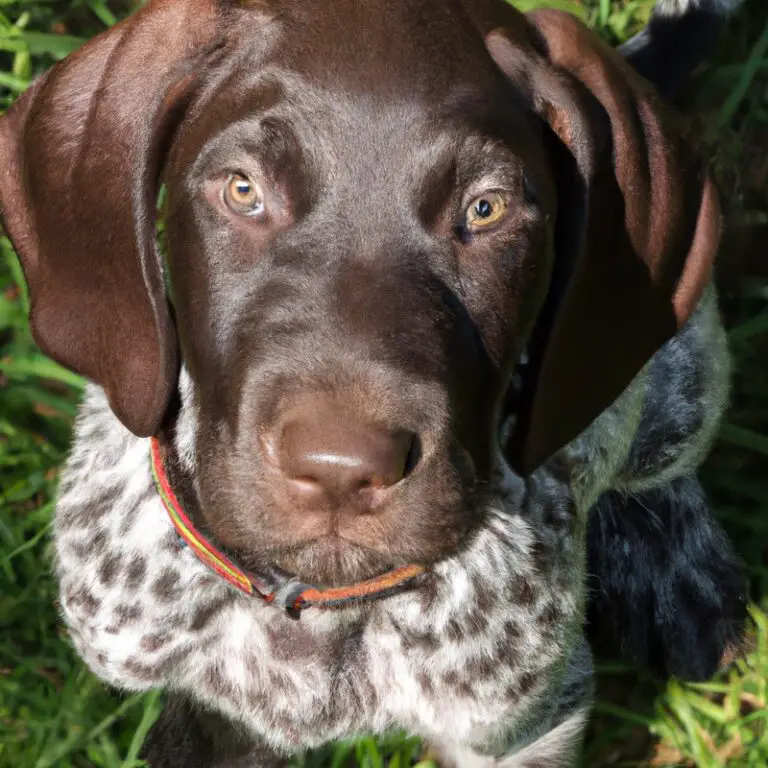How Can I Keep My German Shorthaired Pointer’s Teeth Clean And Healthy?
Key Takeaways:
- 1) Regular dental care is essential to maintaining your German Shorthaired Pointer’s oral health.
- 2) Brushing their teeth and providing dental chews can help prevent plaque and tartar buildup.
- 3) Routine veterinary check-ups and professional dental cleanings are recommended to address any underlying oral health issues.
- 4) A balanced diet and avoiding certain dental hazards can contribute to overall dental wellness for your German Shorthaired Pointer.
Hey there! Are you a proud owner of a German Shorthaired Pointer? Well, then you must know how important it is to keep your furry friend’s teeth clean and healthy.
Dental hygiene plays a crucial role in their overall well-being, making it a top priority for responsible pet owners like yourself.
But where do you even start? Don’t worry, I’ve got your back.
In this article, I’ll guide you through the ins and outs of maintaining a proper dental care routine for your German Shorthaired Pointer.
From daily brushing to alternative methods and preventing dental issues, we’ll cover it all. So, let’s dive in and give your pup the sparkling smile they deserve!
| Action | Description |
| Brushing | Regularly brush your GSP’s teeth using a dog-specific toothbrush and toothpaste. |
| Dental Chews | Provide dental chews or chew toys designed to promote dental health. |
| Raw Bones | Give raw bones or specifically designed dental treats to help clean teeth naturally. |
| Professional Cleaning | Schedule an annual dental cleaning with a veterinarian. |
| Water Additives | Add water additives to their drinking water to help reduce plaque and tartar buildup. |
Importance of Dental Hygiene for German Shorthaired Pointers
Understanding the Dental Needs of German Shorthaired Pointers
Understanding the Dental Needs of German Shorthaired Pointers German Shorthaired Pointers, like all dogs, require proper dental care to maintain their overall health and well-being. Neglecting their dental needs can lead to various oral problems, such as gum disease, tooth decay, and bad breath.
One key aspect of dental care for German Shorthaired Pointers is regular teeth brushing.
Using a dog-specific toothbrush and toothpaste, gently brush your dog’s teeth at least two to three times a week. This will help remove plaque and prevent tartar buildup.
In addition to brushing, providing your German Shorthaired Pointer with appropriate chewing toys can also aid in maintaining good dental health.
Chew toys help reduce plaque and tartar, as well as exercise their jaw muscles. Just make sure to choose toys that are safe and durable.
Lastly, scheduling regular veterinary dental check-ups is essential for identifying any potential dental issues early on.
Your veterinarian will be able to assess your German Shorthaired Pointer’s oral health and provide necessary treatments, such as teeth cleaning or extractions if needed.
Long-Term Consequences of Neglected Dental Hygiene
Neglecting the dental hygiene of your German Shorthaired Pointer can have serious long-term consequences. Firstly, it can lead to the buildup of plaque and tartar on their teeth, which can eventually cause gum disease.
This can cause pain, inflammation, and even tooth loss for your furry friend.
Secondly, neglected dental hygiene can also impact your dog’s overall health. Bacteria from dental problems can enter the bloodstream and affect other organs, such as the heart, liver, and kidneys.
This can lead to more serious health issues down the line.
In addition, poor dental hygiene can contribute to bad breath, which is not only unpleasant for you and your dog but can also be a sign of underlying dental problems. So, it’s crucial to prioritize your German Shorthaired Pointer’s dental health by regularly brushing their teeth, providing appropriate chew toys, and scheduling routine dental exams with your veterinarian.
By taking these steps, you can prevent the long-term consequences of neglected dental hygiene and ensure your dog’s teeth stay clean and healthy.
Establishing a Dental Care Routine for Your German Shorthaired Pointer
Daily Brushing: Essential for Oral Health
Daily brushing is crucial for maintaining your German Shorthaired Pointer’s oral health. By brushing their teeth on a daily basis, you can prevent the buildup of plaque and tartar, which can lead to gum disease and other oral health problems.
Regular brushing also helps to eliminate bad breath and keeps your dog’s teeth clean and white.
Make sure to use a dog-specific toothbrush and toothpaste, as human products can be harmful to dogs. If your dog is not used to brushing, start slowly and gradually increase the time and intensity to make it a positive experience for them.
Choosing the Right Toothbrush and Toothpaste for Your Dog
Choosing the right toothbrush and toothpaste for your dog is important for maintaining their oral health. First and foremost, make sure to use a toothbrush specifically designed for dogs.
These brushes have softer bristles and a shape that can easily fit in your dog’s mouth.
Avoid using human toothbrushes, as they can be too harsh on their gums. When it comes to toothpaste, never use human toothpaste for your dog.
Human toothpaste contains ingredients like fluoride and xylitol, which can be harmful to dogs if ingested.
Instead, opt for toothpaste made specifically for dogs. These toothpastes come in a variety of flavors that are appealing to dogs, making the brushing experience more enjoyable for both of you.
By choosing the right toothbrush and toothpaste, you’ll be able to effectively clean your dog’s teeth and keep their breath fresh.
Remember to introduce dental care gradually to your dog, making it a positive experience for them. With regular brushing, you can help prevent dental issues and keep your dog’s teeth clean and healthy.

Introducing Your Dog to Toothbrushing: Step-by-Step Guide
Introducing your dog to toothbrushing may seem like a daunting task, but with a step-by-step guide, it can be a breeze. Here’s how to get started:
- Gather the necessary supplies: You’ll need a dog-specific toothbrush and toothpaste. Human toothpaste is not safe for dogs, so make sure to get a toothpaste formulated for them.
- Choose the right time: Pick a calm and quiet moment when your dog is relaxed. Avoid rushing or forcing them into it, as it could create negative associations.
- Familiarize your dog with the toothbrush: Let your dog sniff and investigate the toothbrush. You can even let them taste the toothpaste to get them used to the flavor.
- Start with gentle touches: Using your finger or a soft cloth, gently touch your dog’s teeth and gums. This helps them get accustomed to the sensation.
- Gradually introduce the toothbrush: After a few sessions of touching their teeth, introduce the toothbrush and apply a small amount of toothpaste. Start brushing in gentle, circular motions.
- Keep it short and positive: Aim for short daily brushing sessions to build up your dog’s tolerance. Praise and reward them after each successful brushing session to reinforce positive behavior.
Alternative Dental Care Methods for German Shorthaired Pointers
Dental Chews and Treats: Are They Effective?
Dental chews and treats can be helpful in maintaining your German Shorthaired Pointer’s oral health. These specially designed products can help to reduce plaque and tartar buildup, freshen breath, and promote good gum health.
When it comes to effectiveness, dental chews and treats can be a valuable addition to your dog’s oral care routine, but they should not be relied upon as the sole method of dental care.
Regular brushing and professional cleanings are still necessary for optimal dental health. By incorporating dental chews and treats as part of your dog’s overall dental care plan, you can enhance their dental hygiene and contribute to their overall well-being.
Just remember to choose products that are specifically formulated for dogs, as human dental products can be harmful to dogs.
Using Dental Rinses and Water Additives
Using dental rinses and water additives can be beneficial for maintaining your German Shorthaired Pointer’s oral health. These products are designed to combat bacteria and reduce plaque buildup in your dog’s mouth.
They work by killing harmful bacteria and freshening your dog’s breath.
When choosing a dental rinse or water additive, look for products that are specifically formulated for dogs. These products are safe and effective for canine use.
They usually contain ingredients like chlorhexidine or enzymes that help control bacteria and maintain oral hygiene.
To use a dental rinse, simply follow the instructions on the bottle. Most rinses can be added to your dog’s drinking water or used directly in their mouth.
Water additives, on the other hand, are simply added to your dog’s water bowl.
Using dental rinses and water additives should not replace regular brushing, but it can be a helpful addition to your dog’s dental care routine.
Professional Dental Cleanings: When and Why They Are Needed
Professional dental cleanings for your German Shorthaired Pointer are important for maintaining their oral health. While regular home dental care is essential, it’s not always enough to prevent tartar buildup and gum disease.
That’s when professional cleanings come into play.
These cleanings, performed by a veterinarian, involve removing plaque and tartar from your dog’s teeth and under the gum line. This helps prevent dental issues like tooth decay, gum infections, and bad breath.
Professional cleanings also allow the vet to thoroughly examine your dog’s mouth for any potential problems.
The frequency of professional cleanings depends on your dog’s oral health and the recommendation of your veterinarian. Some dogs may require cleanings every 6-12 months, while others may need them more frequently.
Regular check-ups will help determine the appropriate timing for your German Shorthaired Pointer’s dental cleanings.
Preventing Dental Problems in German Shorthaired Pointers
Avoiding Common Mistakes That Lead to Dental Issues
Avoiding Common Mistakes That Lead to Dental Issues Let’s talk about some common mistakes that pet owners often make when it comes to their furry friend’s dental health. First and foremost, neglecting regular dental care can lead to a host of oral problems for your German Shorthaired Pointer.
Brushing their teeth regularly is crucial for maintaining good oral hygiene.
Another mistake is feeding your dog a poor diet. Just like humans, dogs need a balanced and nutritious diet to support their overall health, including their teeth and gums.
Avoid feeding them excessive amounts of sugary treats or low-quality food that can contribute to dental issues.
Ignoring the signs of dental problems is another pitfall. If you notice any signs of bad breath, swollen gums, loose teeth, or difficulty eating, it’s important to address it promptly.
Regular check-ups with your veterinarian can help catch dental issues early on.
Lastly, not providing appropriate dental chew toys or bones can lead to dental problems. Chewing on these toys can help remove plaque and tartar buildup, promoting good oral health for your German Shorthaired Pointer.
By avoiding these common mistakes and taking proactive steps to care for your dog’s teeth, you can help prevent dental issues and keep their smile healthy and bright!
Regular Veterinary Check-ups: Importance for Dental Health
Regular veterinary check-ups are essential for maintaining the dental health of your German Shorthaired Pointer. During these check-ups, the veterinarian will thoroughly examine your dog’s teeth and gums to identify any potential dental problems.
They can detect issues like plaque buildup, gum disease, and tooth decay that may not be visible to the naked eye.
By detecting these problems early on, your veterinarian can recommend appropriate treatments or preventive measures, such as professional cleanings or dental hygiene routines. Regular veterinary check-ups play a crucial role in ensuring your dog’s dental health and preventing further complications down the line.
A Balanced Diet: Impact on Dental Hygiene
A balanced diet plays a significant role in maintaining the dental hygiene of your German Shorthaired Pointer. What your dog eats directly affects their dental health.
By providing them with a balanced and nutritious diet, you can help prevent dental problems.
Including dental-friendly foods in their diet, such as crunchy fruits and vegetables, can help naturally clean their teeth and massage their gums. These foods can also help remove plaque buildup and freshen their breath.
Avoiding sugary and sticky treats is also crucial, as they can contribute to tooth decay and gum disease.
Signs of Dental Problems in German Shorthaired Pointers
Recognizing the Symptoms of Dental Disease
Recognizing the symptoms of dental disease in your German Shorthaired Pointer is important for maintaining their oral health. First and foremost, pay attention to any changes in your dog’s breath.
Persistent bad breath can indicate dental issues such as gum disease or tooth decay.
Another symptom to watch out for is excessive drooling or saliva production. This may suggest pain or discomfort in the mouth.
Additionally, keep an eye on your dog’s eating habits.
If they suddenly start eating less or favoring one side of their mouth while chewing, it could be a sign of dental problems. Other symptoms to be aware of include swollen or bleeding gums, loose teeth, and difficulty in opening or closing the mouth.
Regularly inspecting your dog’s teeth and gums can help you catch dental disease early on.
If you notice any of these symptoms, it’s best to consult with your veterinarian. They will be able to provide a proper diagnosis and recommend appropriate treatment to keep your German Shorthaired Pointer’s teeth clean and healthy.

Red Flags That Indicate a Dental Issue
Red flags that indicate a dental issue in your German Shorthaired Pointer can include bad breath, excessive drooling, visible tartar or plaque buildup, swollen or bleeding gums, difficulty chewing or eating, and tooth loss. If you notice any of these signs, it’s important to take action and seek veterinary care.
Regular dental check-ups and daily dental hygiene care can help prevent dental problems and keep your pup’s teeth healthy.

Potential Complications and Risks
Potential Complications and Risks Taking care of your German Shorthaired Pointer’s dental health is essential to prevent potential complications and risks. Ignoring dental care can lead to various problems, such as:
- Dental disease: If left untreated, dental disease can cause pain, infection, and tooth loss in your dog. It can also lead to more severe health issues, affecting organs like the heart and kidneys.
- Bad breath: Poor dental hygiene can contribute to persistent bad breath in your German Shorthaired Pointer. This can be a sign of dental disease or other oral health problems.
- Difficulty eating: Dental issues, such as tooth decay or gum disease, can make it painful for your dog to eat. This can lead to malnourishment and weight loss if not addressed.
- Tooth fractures: Chewing on hard objects or trauma can result in tooth fractures. These fractures can be painful and may require extraction or other dental procedures to resolve.
- Oral tumors: Neglecting your dog’s oral health can increase the risk of developing oral tumors. Early detection is crucial for successful treatment.
To avoid these potential complications and risks, prioritize regular dental care for your German Shorthaired Pointer. Regular brushing, professional cleanings, and veterinary check-ups are key to maintaining their dental health and overall well-being.
Frequently Asked Questions about German Shorthaired Pointer Dental Care
How often should I brush my German Shorthaired Pointer’s teeth?
When it comes to brushing your German Shorthaired Pointer’s teeth, consistency is key. It is recommended to brush their teeth at least 2-3 times a week to maintain good oral hygiene.
By making it a regular part of their routine, you can help prevent dental issues like tartar buildup and gum disease.
Remember to use a dog-specific toothbrush and toothpaste, as human products can be harmful to dogs. Your veterinarian can provide further guidance on the best dental care practices for your furry friend.
Can I use human toothpaste for my dog’s dental care?
No, you should not use human toothpaste for your dog’s dental care. Human toothpaste contains ingredients that can be harmful to dogs if ingested, such as fluoride and artificial sweeteners like xylitol.
These ingredients can cause stomach upset and even toxicity in dogs.
Instead, use toothpaste specifically formulated for dogs, which is safe for them to swallow. It’s always best to consult your veterinarian for recommendations on dental care products for your German Shorthaired Pointer.
Are there any breeds more prone to dental problems?
Certain dog breeds are more prone to dental problems than others. This can be attributed to various factors such as genetics, mouth structure, and overall health.
Some of the breeds commonly known to have dental issues include:
- Small breeds: Small dogs, such as Chihuahuas and Yorkshire Terriers, often have overcrowded teeth due to their limited jaw space. This can lead to plaque and tartar buildup, gum disease, and tooth decay.
- Brachycephalic breeds: Breeds with flat faces and short noses, like Bulldogs and Pugs, are prone to dental problems. Their crowded teeth and misaligned jaws make it difficult for them to chew properly, increasing the risk of dental issues.
- Toy breeds: Toy breeds, such as Maltese and Shih Tzus, are predisposed to dental problems due to their small size and delicate teeth. Their teeth are more prone to fractures and decay if not properly cared for.
- Dachshunds: Dachshunds have a long, narrow jaw which can lead to misalignment and overcrowding of teeth. This can make it harder to clean their teeth effectively, leading to dental issues over time.
Final Verdict
Maintaining proper dental hygiene for your German Shorthaired Pointer is crucial for their overall health and well-being. Neglected dental care can lead to serious long-term consequences, such as periodontal disease and tooth loss.
By establishing a dental care routine, including daily brushing with the right toothbrush and toothpaste, introducing your dog to toothbrushing gradually, and incorporating alternative methods like dental chews and rinses, you can effectively prevent dental problems.
Regular veterinary check-ups and a balanced diet also play a significant role in maintaining your dog’s dental health. Remember, early detection of dental issues is key, so be vigilant and watch for any signs of dental problems.
By following these guidelines and seeking professional help when necessary, you can ensure that your German Shorthaired Pointer has clean and healthy teeth throughout their life.







